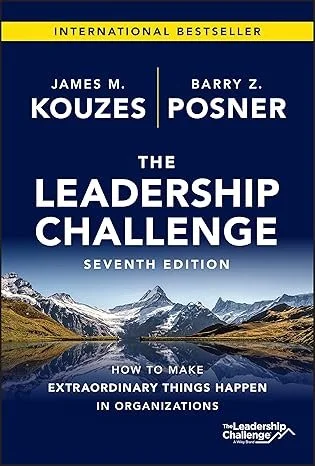The Leadership Challenge
If you’re a consumer of leadership books, it’s likely you’ve encountered The Leadership Challenge. James M. Kouzes and Barry Z. Posner’s seminal work is a foundational text in leadership studies, first published in 1987 and continually updated to reflect the evolving realities of organizations and cultures.
I love this book because of its core philosophy: leadership can be learned. “Leadership is not about personality; it’s about behavior—an observable set of skills and abilities” (Kouzes & Posner, 2017, p. 11). This perspective positions leadership as accessible to anyone committed to growth, rather than a trait reserved for a charismatic few.
Moreover, the book integrates the emotional and relational dimensions of leadership, often neglected in more mechanistic models. The book portrays leadership as a deeply human endeavor requiring empathy, authenticity, and the ability to inspire meaning. This holistic vision resonates strongly with contemporary leadership needs in volatile, uncertain, complex, and ambiguous (VUCA) environments.
“Leadership is not about telling others what to do. It’s about inspiring them to want to do it”
The Five Practices of Exemplary Leadership
1. Model the Way
Effective leadership begins with credibility. Leaders must identify and express their values, and then align their actions with those values. “Titles are granted, but it's your behavior that wins you respect” (Kouzes & Posner, 2017, p. 14).
Leaders model the way by setting an example through daily actions and small wins, demonstrating commitment to shared values. This consistency between word and deed is essential to building trust and legitimacy.
2. Inspire a Shared Vision
Vision is central to leadership. Leaders must be able to imagine the future and communicate their vision in a compelling and inclusive way. “Leaders inspire a shared vision by envisioning the future, creating an ideal and unique image of what the organization can become” (Kouzes & Posner, 2017, p. 105).
Accomplishing the vision requires that others own it emotionally, rather than just being the will of the leader. Leaders who co-create their vision with their teams have much better success achieving buy-in to that vision.
3. Challenge the Process
Innovation and change are inherent to effective leadership. Leaders must be willing to question the status quo, understand the systems at play, and take calculated risks to drive improvement. “Leaders venture out. They test and experiment and try new ways of doing things” (Kouzes & Posner, 2017, p. 157).
Change management involves not only initiating change but also learning from failure. Courage and resilience are necessary traits, as transformational leaders often face resistance. The capacity to challenge the process is what enables growth and adaptation.
4. Enable Others to Act
Leadership is not about individual heroism but collective capacity. Kouzes and Posner emphasize the importance of fostering collaboration and strengthening others. Empowerment, mutual respect, and competence-building are key components of this practice.
Leaders must create environments where people feel a sense of ownership and have the resources and support to act with confidence.
5. Encourage the Heart
Finally, leadership requires recognition and emotional intelligence. Leaders must celebrate values and victories to maintain morale and motivation. “Recognition is the most powerful currency a leader has,” the authors explain (Kouzes & Posner, 2017, p. 272).
Celebrating contributions and acknowledging efforts reinforces commitment to shared goals. This practice highlights the human side of leadership, affirming that people need appreciation and affirmation to thrive and flourish.
Conclusion
The Leadership Challenge remains one of the most influential leadership books of the past four decades. By articulating five clear, actionable practices rooted in empirical research and human values, Kouzes and Posner have offered a roadmap for ethical, effective, and relational leadership. As they conclude, “Leadership is not about telling others what to do. It’s about inspiring them to want to do it” (Kouzes & Posner, 2017, p. 295).












Victor Marte reviews Peter Scazzero’s Emotionally Healthy Leadership